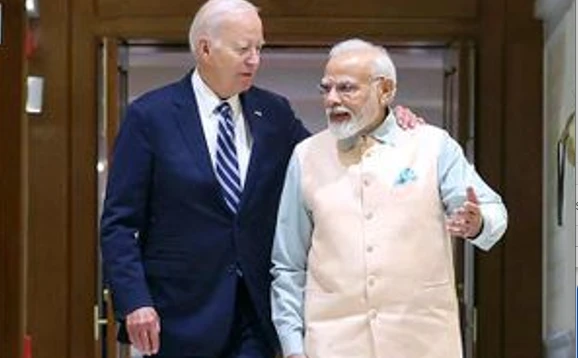Indian Prime Minister Narendra Modi on Monday spoke with US President Joe Biden about his visit to Ukraine, with the White House voicing hope that he embraced Kyiv's view on ending Russia's invasion.
Modi, who angered Ukrainians by hugging Russian President Vladimir Putin in Moscow recently, visited Kyiv on Friday and told President Volodymyr Zelensky that "no problem should be solved on the battlefield."
Speaking to Biden by telephone, Modi "reiterated India's consistent position in favor of dialogue and diplomacy and expressed full support for (an) early return of peace and stability," an Indian foreign ministry statement said.
Asked about Biden's response, National Security Council spokesman John Kirby said that the United States supported all countries listening to Zelensky's perspectives on ending the war.
"We welcome any other country that wants to help President Zelensky work towards this just peace," Kirby told reporters.
The White House later released a readout of the call that said Biden "commended the prime minister" for "his message of peace and ongoing humanitarian support for Ukraine, including its energy sector."
Modi and Biden "affirmed their continued support for a peaceful resolution of the conflict in accordance with international law, on the basis of the UN Charter," the White House said.
Zelensky has called for the return of all territory seized by Russia, which launched a full-scale invasion of Ukraine in February 2022.
India has not explicitly backed Zelensky's stance. Despite increasingly close relations with Washington, India has refused to join US sanctions on Moscow, with which it has historic relations, and instead has embraced Russia as a cheaper source of oil.
India said that Modi and Biden also discussed Bangladesh, where leader Sheikh Hasina, a close ally of New Delhi, resigned and fled earlier this month after mass protests against her increasingly authoritarian rule.
The Indian statement said that Modi and Biden "emphasized restoration of law and order and ensuring safety and security of the minorities, particularly Hindus, in Bangladesh."
In the immediate aftermath of Hasina's fall, attacks on Hindus across Muslim-majority Bangladesh were reported. The security situation has since far improved.
The United States had repeatedly criticized Sheikh Hasina for backsliding on democracy but, knowing that India was far more invested in Bangladesh, had been careful not to clash openly with New Delhi.


